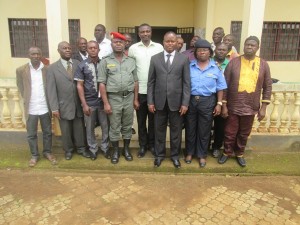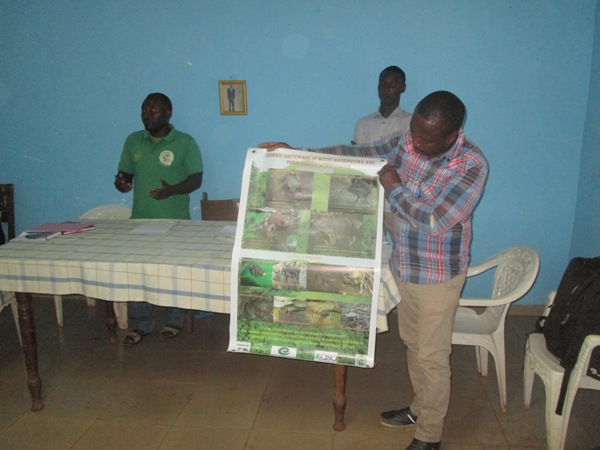
Stanley Acham
According to the chiefs, the people of Muanenguba I and II are very committed to seeing the project realised.
“Conservation is wealth which you can’t recreate, I have personally understood the importance of keeping what you have, and one must therefore do everything possible to keep it in tact. My people and I are very committed and are available at any time if our services are needed,” HRH Eboua Ngolo …, chief of Manengouba I village said.
The chiefs acknowledged the fact that creating an integral ecological reserve at Mt. Muanenguba will bring in a lot of bounties to the people of Muanengouba I and II.
“Our youths and women, including our men will work in the Reserve. We shall have alternative sources of income that will boost the economy of our villagers. I stand here on behalf of my people to say, we give our full support to the project,” HRH Koffi Essoh…, chief of Manengouba II village said.
The Chiefs, elites, notables and some group representatives of the two communities, promised to uphold the projects objectives as a top priority and also educate their communities on the importance of the proposed Mount Muanenguba Integral Ecological Reserve creation.
Speaking during the sensitisation meeting, the Divisional Officer for Nlonako-Ebone, Mr Bengande Jean Faustin called on all participants to be conscious, participative and give support towards the creation of this Integral Ecological Reserve. He underscored the importance of having such area protected.
“This area with its unique biodiversity will be developed for ecotourism, scientific research and will create employment for some of your inhabitants. With particular attention made on the conservation of amphibians which is important for medical research. I want to call on the chiefs of these communities who are custodians of the shrines found in this area, that their tradition will not be affected. So I plead with you to collaborate for the success of this project,” the DO beckoned.
On his part, the Chief of Wildlife for Moungo emphasized on the significance of the project to the government of Cameroon and the local communities. He urged the two new communities to engage their various communities towards the creation and management of the proposed Integral Ecological Reserve.

Mount Muanenguba, which cuts across the Southwest and Littoral Regions of Cameroon is said to have a heterogeneous Ecosystem, harbouring 100 species of amphibians, 89 species of reptiles and 270 bird species amongst which 60% of them are endemic. The Mountain with height of 2411 meters above sea level, suffers chronic threats from communities living adjacent to the mountain. Habitat degradation, which involves conversion of natural land for agricultural land through shifting cultivation, destruction of trees for commercial purposes, overgrazing and trespassing of cattle in streams and water ponds, collection of amphibian and reptile species, amongst others, are the main threats rocking the mountain.
Faced with all of these challenges, Cameroon’s leading conservation NGO, the Environment and Rural Development Foundation (ERuDeF), has joined forces with the Cameroon Herpetology-Conservation Biology Foundation (CAMHERP-CBF) with support from Rain Forest trust to conserve the rich biodiversity and Ecosystem of Mount Muanenguba with focus on Amphibians and Reptiles.



